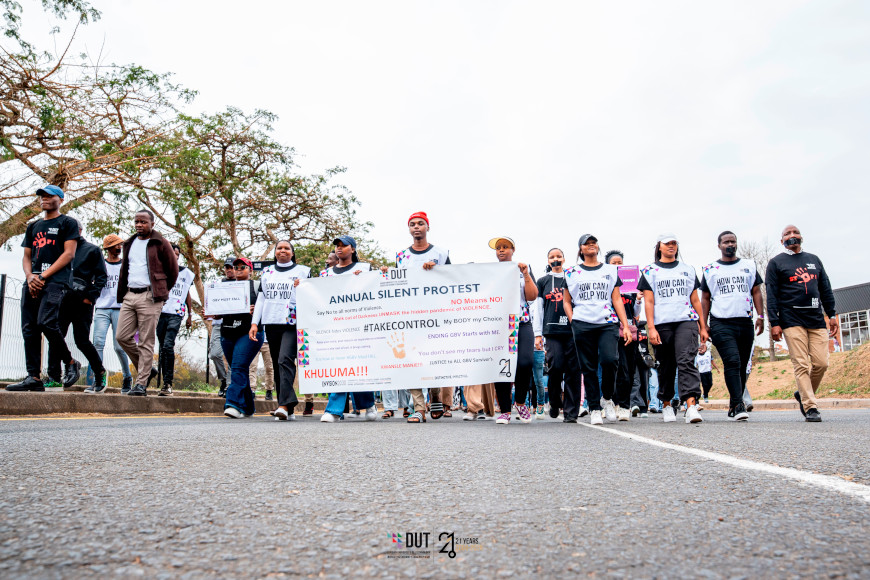The Durban University of Technology’s (DUT’s) HIV and AIDS Centre recently hosted its 11th Annual Silent Protest at the Indumiso Campus. The event began with a silent march from the campus gate to the Main Hall, followed by a symbolic gesture where participants lay on the floor to honour victims who lost their lives to gender-based violence.
Ms Sphumelele Nzimande, Programme Director from the Centre for Excellence in Learning and Teaching at DUT, brought an energetic vibe to the room. Her facilitation skills created a conducive atmosphere for engaging discussions and meaningful interactions, setting the stage for productive conversations.
Ms Sthembile Mabaso, representing the Interim Director of Student Services and Development, delivered a warm welcome address and outlined the purpose of the gathering, setting the tone for a productive and meaningful session.
“I wish to pledge our full support, not only for this important gathering, but also for the cause that it represents. We believe that our efforts will not only transform the outcomes within our university spaces, but also in the communities and societies. We also cannot ignore the alarming rise that is being reported when it comes to cases of sexual harassment within our institution. Gatherings as such along the previous initiatives that are done by different communities and different units proves that this is a problem, and we cannot just continue as if this is a normal situation,” said Mabaso.
Sister Soori Wardthen, Acting Director of Student Counselling and Health, delivered a message of support to the students, emphasising the importance of kindness, solidarity, and collective action in supporting victims of abuse and fighting against injustices
“As we gather for the 11th silent protest, we stand together in solidarity, with passion and hope. We have come together to raise awareness about issues that often go unnoticed but are deeply felt. Our silence is a powerful statement, an invitation to listen, to understand and to acknowledge the experiences of those affected by injustice, disrespect and abuse,” said Sister Wardthen.
She added that the silent protest event is a powerful reminder of their collective voices even during their silence, and that it is a testament to their shared commitment to justice, equality and to the well-being of every victim in communities.
Speaking on behalf of the Students Representative Council (SRC), Social and Welfare Officer Ms Slindile Mabonga shared that they are gathered for something far greater than a programme on paper.
“As the DUT community, and as a nation, we are often guilty of hearing without listening. We assume instead of engaging. We talk over instead of pausing to understand. These protest calls us to truly listen to survivors, to one another, and to the pain that too often hides behind silence. Listening is the beginning of respect, and respect is the foundation of a safe, caring, and humane society. The silence we carry today is not empty. Behind it are stories of violence, of fear, of survival, and of lives disrupted. Our silence is not only about pain. It is about a call, a demand, a declaration that things cannot stay the same. We cannot ignore what is happening in our residences, in our classrooms, in our communities, and in our country. Gender-based violence is not someone else’s issue it is our issue. It affects us all,” said Mabonga.
Dr Kylah Forbes-Biggs, a lecturer in Public Management and Economics at the Durban University of Technology (DUT), delivered a powerful keynote address sharing her personal experiences as a survivor of Gender-Based Violence (GBV). Her aim was to empower students to speak out against any form of abuse they may encounter or witness, providing a safe space for those who have been victimised to share their fears.
As a renowned expert in disaster risk reduction and management with a specialisation in Gender and Disasters, Dr Forbes-Biggs has been instrumental in developing initiatives like the Girls in Risk Reduction Leadership (GIRRL) Programme. This programme focuses on building resilience and leadership skills among adolescent girls in South Africa.
The event continued with a panel discussion facilitated by Student Counselling and Health Psychologist, Ms Anita Masinyane featuring diverse organisations, such as the Nstika Men’s Network, Qhakaza Ladies Network, Rainbow Alliance, and the DUT Student Representative Council, along with other key stakeholders.
Dr Nonhlanhla Mthiyane, Campus Director of the Midlands Campuses, then delivered the closing remarks, extending her gratitude to the event organisers for hosting such a vital and impactful initiative.
Pictured: DUT students at the 11th Annual Silent Protest.
Photographer: S’bonelo Dlamini
Thubelihle Dumakude

